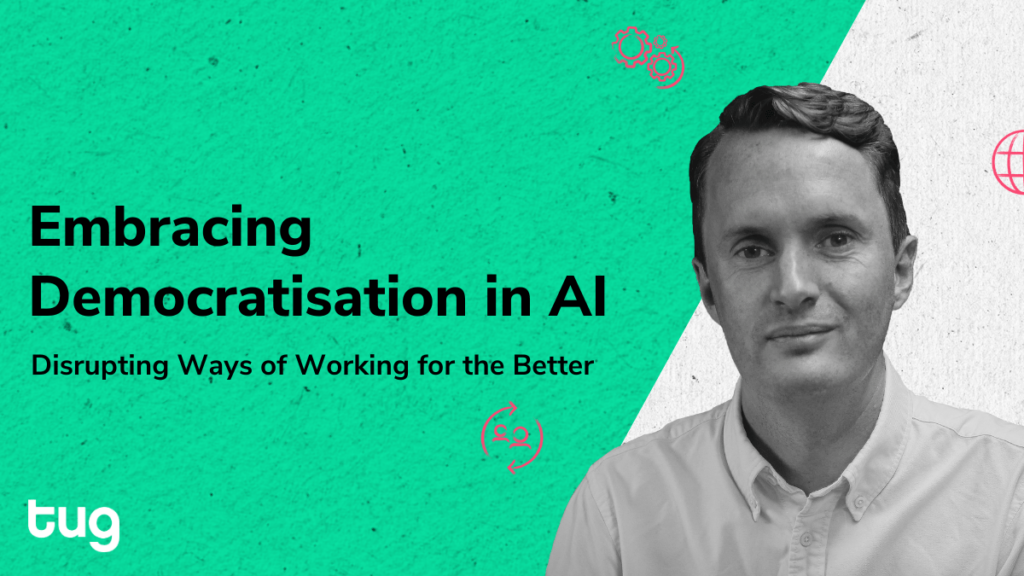
Embracing Democratisation in AI
Interest in AI has erupted over the past year. A flurry of Large Language Model-driven tools have been released during this time, including the likes of ChatGPT and Google Bard. Their capabilities continue to make headlines, but not all are positive. Many have even catastrophised their integration into the white-collar workforce. One title from an Insider article reads ‘ChatGPT may be coming for your jobs. Here are the 10 roles that AI is most likely to replace’. Another from Wired questions ‘Who Will You Be After ChatGPT Takes Your Job?’.
While clickbait-worthy, I believe this is far from the reality of the situation. AI isn’t necessarily here to steal jobs. It’s here to augment them.
The recent releases of LLM-driven tools have democratised generative AI. It’s removed the gatekeepers, and given those outside of the industry easy access to exciting technology. Many digital marketers have leapt at the opportunity of integrating this into their work. Since its release, LLM-driven tools like ChatGPT have been used to support the creation of briefs, copy, graphic designs and so much more. Naturally, this has led marketers to question whether these AI tools could replace the role of creatives. It’s an interesting idea, however I believe the answer is currently a resounding no.
Marketing creative is built to connect with humans. Its purpose is to elicit emotion and relate to its audience. While these AI tools can generate content, it can oftentimes be stripped of emotion and personality, which can ultimately create a disconnect between creative and reader. Marketing professionals are therefore needed to ground creative in human experience and perspective.
These AI services are tools, and should be seen as such – turbocharging the creative’s toolbox and enabling work to be developed at scale.
The Tip of the (A)Iceberg
It’s certainly exciting that generative AI has been made so easily accessible, but it really only scratches the surface of AI’s capabilities within the digital marketing space.
Moving away from the generative side, there are various different facets to AI that can help marketers unlock more of its true potential – including insight.
With greater insight, marketers can learn more about how AI understands and interprets both content and modelled data. A stand-out example is how Google’s AI algorithms interpret content on a website and connect it to user intent. Seeing online content through Google’s point of view can be incredibly useful when it comes to optimising your own.
At Tug, we’ve developed a suite of tools to help digital marketers harness this technology – seeing what useful, rank-worthy content is in Google’s eyes, and ultimately tapping into the desired audience search intent.
Our Intent Mining (IM) tool uses advanced Natural Language Processing (NLP) technology to understand the motivational intent of users (i.e., what people are really wanting to find through search), and the type of content Google understands as matching this intent. From this, IM can then more accurately identify your audience’s wants and needs. Take the search term ‘apple for sale’ as a theoretical example here. While you may be trying to target users looking to buy fruit, the IM tool might recognise that most users searching for this term (and therefore what Google is most likely to rank for this term) are looking to purchase products from the tech company Apple instead. With this knowledge, you can make more informed decisions on how to structure your online content.
Another tool we’ve developed is Entity Monitoring. This also utilises advanced NLP technology to help you learn how search engines understand content and key search phrases from a given sector. With this understanding, you can then work towards optimising the online content around these products, ultimately enabling search engines to comprehend them with greater accuracy.
These are just two of a huge range of AI tools currently at digital marketers’ disposal. Industry professionals shouldn’t avoid AI, and those that do could fall behind their competitors. This technology has the potential to disrupt ways of working for the better, and we should embrace it, rather than resist.
Eoin O’Neill is CTO and Global Head of SEO at Tug Agency


